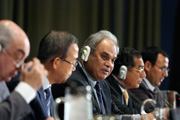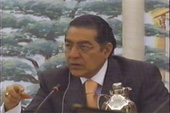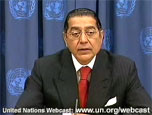 Mr. President, Excellencies, It is my honor to deliver this explanation of position on behalf of the Group of 77 and China. At the outset, we wish to once again sincerely thank the Government and people of France for hosting the Conference and for their kind hospitality. We also thank the Co-Host, Costa Rica and the Co-facilitators, Australia and Cabo Verde, for their respective parts in ensuring the Conference and Outcome were a success. The Group sees a significant importance of the declaration to be adopted by consensus. Our oceans and seas are critically important as they are our planet's lungs. They produce over 50% of oxygen, they are home to most of earth's biodiversity, they regulate our climate and support the livelihoods. They are essential for our food security, economic growth, planetary health, and are an integral source for our identity and culture. The Group believes the document before us tries to address our deep concern over the accelerating degradation of marine ecosystems, marine pollution, including plastics and chemical runoff, overfishing, illegal, unreported and unregulated (IUU) fishing, loss of biodiversity, acidification and warming of ocean waters. Many of the countries of our Group are Small Island Developing States (SIDS), Least Developed Countries (LDCs), and coastal developing nations, and to them the Ocean is not only a body of water, but also a resource, a life and survival. The Group reaffirms the central role of multilateralism in advancing sustainable ocean governance, and calls for united, global action that leaves no nation behind in safeguarding the ocean as a common heritage of humankind. We recognize that SDG 14 is one of the least funded SDGs and that accelerating ocean action globally requires significant and accessible finance and the fulfilment of existing commitments and obligations under relevant intergovernmental agreements. It also requires adequate and scaled up means of implementation for developing countries, in particular SIDS and LDCs, to address the funding gap of SDG 14. We are hopeful that the Conference Outcome Document will provide the momentum needed for SDG14 and our oceans and seas. We therefore urge our development partners, the UN system, multilateral institutions, including the International Financial Institutions, and all stakeholders to timely step up with genuine ambition, solidarity and financing. Mr. President, Excellencies, The time to act is not tomorrow. The time to act is now… for our ocean… for our planet… and for our people and future generations. Thank you. Mr. President, I am pleased to deliver this statement on behalf of the Group of 77 and China. At the outset, we extend our gratitude to the Government and people of the Kingdom of Spain for hosting this historic Conference in the city of Seville, and for the warm hospitality extended to our delegations. It is a privilege to gather here to endure commitment to multilateralism and global partnership, particularly on this critical issue of financing sustainable development. Through you, Mr. President, the Group of 77 and China wishes to express its sincere appreciation to the Co-Chairs of the Preparatory Committee and the Co-Facilitators of the outcome document for their leadership and stewardship throughout this complex and important process. We also appreciated all their efforts to ensure that the process remained inclusive and transparent. Mr. President, This Conference is being held at a critical juncture in the global development agenda. With less than five years remaining to achieve the Sustainable Development Goals, the world remains significantly off track to achieving the ambitious Agenda we committed to in 2015. The financing gap continues to widen, and the challenges confronting the Global South have become more acute, more interlinked, complexed and more urgent, demanding coordinated international action and renewed political will. Against this backdrop, the Group of 77 and China welcomes the adoption of the outcome document of this conference by consensus, which we view as an important step toward reinvigorating the global partnership for development. We support this document as a balanced, constructive and forward-looking framework that reflects the collective aspiration to scale up efforts in mobilizing financing for sustainable development, particularly for developing countries. The Group recognizes this outcome as a reaffirmation of our shared commitment to multilateralism, solidarity, and cooperation. It must serve as a foundation to address the systemic imbalances in the global economic and financial system and to ensure that the voices, needs, and priorities of developing countries are meaningfully addressed. Mr. President, The Group of 77 and China reiterates the centrality of North-South cooperation as the core foundation of international development cooperation. We emphasize the importance of fulfilling all official development assistance (ODA) commitments, and of providing adequate, predictable, timely and concessional finance to developing countries, in line with their national priorities and development strategies. At the same time, we reaffirm the value of South-South cooperation as a complement, not a substitute, for North-South cooperation, guided by the principles of solidarity, mutual respect, and non-conditionality. We further underline the importance of strengthening domestic resource mobilization which need to be supported by an enabling international economic environment and effective means of implementation; improving the international tax system; scaling up foreign direct investments in developing countries; lowering remittance costs; channeling private resources for sustainable development; reforming the international financial architecture; ensuring fair representation of developing countries in international financial institutions; eliminating all unilateral economic, financial or trade measures against developing countries and expanding access to technology, capacity-building, and long-term financing. Mr. President, Despite its imperfection, we believe that what the Compromiso de Seville contains is a very good basis for us to continue to build on to deliver the quality and quantity of funding to accelerate sustainable development. It is imperative that we continue to focus on those furthest behind and ensure that we live up to our commitment to leave no one or country behind, noting that if one of us fail to achieve the Agenda we would have all failed. Therefore, moving forward, we must ensure the effective implementation of the commitments made in this outcome. We must also strengthen the role of the United Nations in the follow-up and review process, in order to guarantee that the financing for development agenda remains anchored in multilateralism and inclusivity. Mr. President, Let us use this conference to renew our shared commitment to multilateralism for achieving the sustainable development goals by 2030, because challenges the world faces do not respect national borders No single country can achieve the SDGs alone as it will requires shared vision, collective action and global cooperation. Let us translate promises into action and reaffirm that no country or person should be left behind. Let us work together to shape a global financial architecture that serves the interests of all, not the few. The Group of 77 and China stands ready to engage with all partners to ensure that financing for development becomes a true engine for sustainable and equitable progress. I would now like to deliver a statement in my national capacity. Mr. President, 1. I have the honor to deliver this statement on behalf of the Group of 77 and China. 2. On this day 80 years ago, following a horrific war and gruesome period in time several nations came together to establish the United Nations and its foundational document, the UN Charter, which was finalized and adopted at the San Francisco Conference in 1945. 3. On this auspicious occasion as we commemorate the signing of the Charter of the United Nations, some 8 decades in, we find ourselves at the cusp of multiple crises, including a serious threat of war, which goes contrary to the fundamental principles and purposes of the Charter. We therefore, must reflect on and fully respect the principles and purposes of the Charter of the United Nations and international law, particularly as they relate to equality among States, respect for the independence of States, national sovereignty, territorial integrity and non-interference in the internal affairs of States, and stress that those principles and purposes inspire our full commitment to multilateralism and the search for a more just and equitable international economic system that offers opportunities to eradicate poverty and raise the standard of living of our peoples. 4. The Group of 77 and China reiterated its commitment to the ideals of the United Nations Charter to ensure that the dignity of every person is respected and to foster the attainment of social progress and better standard of living for all. The Group commits to do everything it can through partnerships to fulfill obligations to foster peace, while ensuring prosperity for people and planet, through the proper execution of the three equally important, interlinked and mutually reinforcing pillars of the United Nations - peace and security, human rights and development, in a balance and equitable manner, and calls on all the Member States of the UN to do the same. Mr. President, 5. The Group of 77 and China also calls on all nations to seize this opportunity to renew the multilateral spirit of this August Organization and its Charter, which we all joined with the hope of working together to create a better tomorrow for the current generation and for many more generations to come. Let us remember why we chose to come together it was with the hope to support each other to tackle present and future problems and challenges facing humankind, and arriving at solutions within an overarching framework agreed to multilaterally, in a democratic and equitable way, and inspired by common interests and aspirations of "we the peoples of the United Nations". 6. We need to work, cooperate and exist together in harmony, solidarity and peace because we know that "United we stand, divided we fall". I thank you. 31st Annual Meeting of Ministers for Foreign Affairs (27 September 2007)
Press Briefing by G-77 Chairman at the 41st G-77 Chapters Meeting (26-27 February 2007)
Press Conference by G-77 Chairman on G-77 Agenda and UN Reform (20 February 2007)
|
|||||||

 Print
Print
 RealPlayer
RealPlayer


